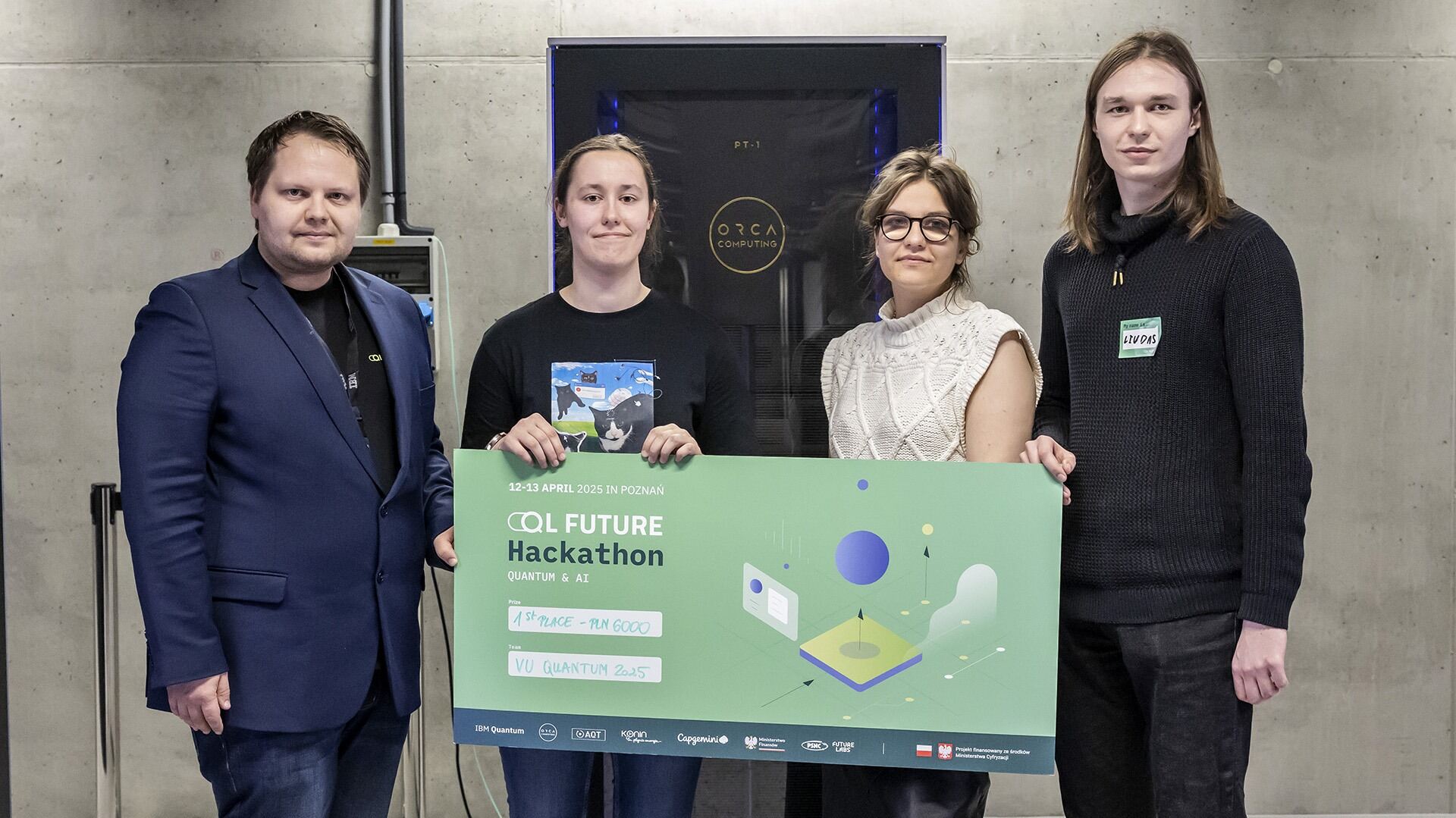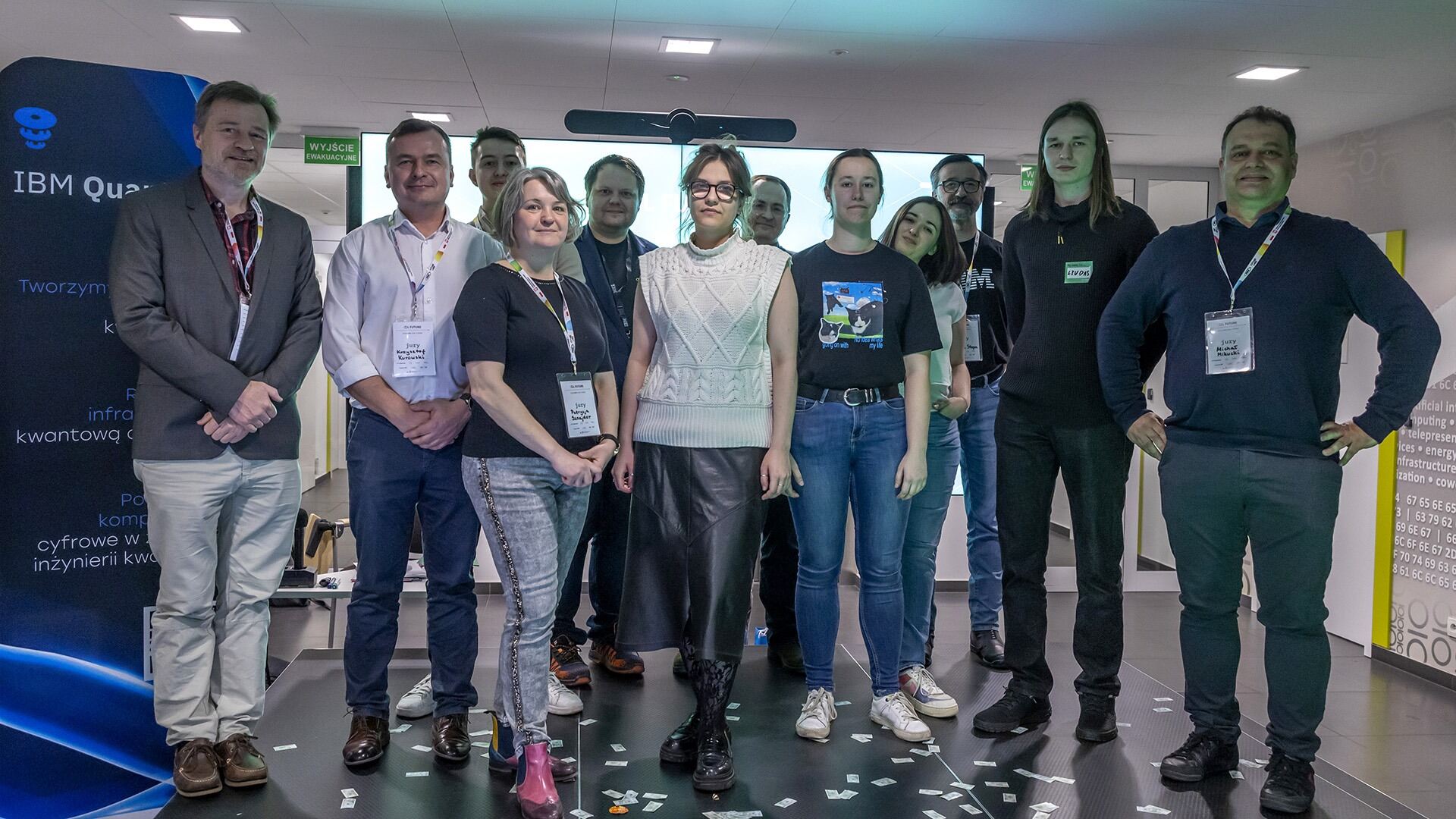VU Student Team Triumphs at Quantum Computing Hackathon With Their Sustainable EV Charging Solution

A team of students from the Faculty of Mathematics and Informatics at Vilnius University (VU MIF) has won first place at the international QL Future Hackathon, where they proposed a solution to one of today’s most pressing challenges – how to charge electric vehicles (EVs) sustainably.
During the QL Future Hackathon, held on 12–13 April in Poznań (Poland), VU MIF students – Liudas Kasperavičius, Rugilė Vasaitytė, and Agnė Petkevičiūtė, supervised by Assoc. Prof. Linas Petkevičius – presented a hybrid quantum-classical algorithm for optimising EV charging. They employed the Quantum Approximate Optimisation Algorithm (QAOA) to schedule charging times in a way that maximises grid capacity usage while simultaneously minimising energy consumption.
The number of EVs is growing rapidly across Europe – in 2023, they accounted for nearly 20% of all new car sales, with an even steeper increase expected by 2030. This expansion presents major challenges to energy infrastructure, as poorly managed charging could lead to grid overloads. This highlights the need for smart solutions that enable efficient EV charging while saving energy, time, and costs.
For the second year running, VU MIF teams are among the best
The Poznań Supercomputing and Networking Center (PSNC) organised the hackathon in collaboration with leading international partners – ‘ORCA Computing’, ‘IBM’, and ‘Capgemini’. A total of 22 teams from across Europe competed to develop the best quantum-based solutions to real-world problems.
This is the second major achievement for the VU MIF team at events organised by PSNC. Last year, a team consisting of Gabrielius Keibas, Pijus Petkevičius, and Dr Marco Marcozzi took second place in the technical implementation category of the QL Future Health & Safety Hackathon.
This year’s QL Future Hackathon presented five different tasks. The first one was prepared by ‘ORCA Computing’: participants were tasked with building quantum neural networks compatible with the ‘ORCA Computing’ quantum computer. The participating teams had to employ hybrid-quantum and classical neural networks for medical image classification.
The second task was created by ‘Capgemini’. It challenged teams to develop a quantum solution for land-use optimisation, taking into account environmental, social, and economic factors.
The third one was proposed by the ‘IBM’ and PSNC teams. Their challenge focused on optimising microgrid energy management and network load to reduce energy losses, EV charging costs, and CO₂ emissions.
The fourth task was developed by PSNC and aimed at creating a quantum solution for detecting cyberattacks in network traffic, while ‘Fintech’, together with the PSNC, presented the fifth task – students had to develop a quantum solution for optimising options trading strategies.

Each team could decide which of the five challenges to work on. The VU MIF team selected the third task – optimising energy use in microgrids, with a particular focus on efficient EV charging.
‘It is rewarding to see our students applying the knowledge gained in our faculty courses, such as ‘Introduction to Quantum Computing’, in international competitions. This speaks not only to their motivation but also to the high quality of our studies,’ said team leader Assoc. Prof. Linas Petkevičius.
VU’s contribution to the quantum future – from agenda to international projects
The year 2025 has been officially declared the International Year of Quantum Science and Technology, highlighting the growing global emphasis on quantum innovation. Lithuania is playing an active role in this progress: this year, the Lithuanian Quantum Technologies Agenda was introduced, and VU MIF researchers continue to represent the country at major international events.
VU MIF scientists also took part in drafting the Quantum Technologies Agenda, which outlines the current state of quantum technologies in the country and defines the next steps forward. ‘To truly benefit from quantum technologies, we must first invest in knowledge and education. If we don’t do our homework now, we risk becoming mere users rather than creators,’
stated Prof. Remigijus Paulavičius, who lectures at VU MIF and is Vice President of the Lithuanian Quantum Technologies Association.